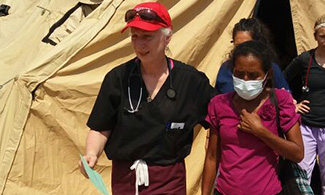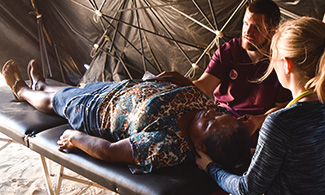Wednesday, April 20, 2016
Thu, 21 Apr 2016 | Shelley Andrews :: LUCOM Marketing and PR
Your last doctor’s visit was probably very different from the experience of a middle-aged woman living in the Zacapa region of Guatemala.
 Student-doctors and faculty from Liberty University College of Osteopathic Medicine (LUCOM) met this woman on the last day of their medical outreach clinic the week of March 11-18.
Student-doctors and faculty from Liberty University College of Osteopathic Medicine (LUCOM) met this woman on the last day of their medical outreach clinic the week of March 11-18.
“I thought to myself, ‘How did she walk here? How did she get here?” said Kathy Bogacz, M.D., LUCOM assistant professor, Department of Internal Medicine.
The team traveled to Guatemala over the LUCOM Spring Break with a goal of providing needed health care to the rural, underserved population. LUCOM is reaching out to the Zacapa region through a continuing partnership with Hope of Life International (HOLI).
“When we got to the clinic on that last day, one woman was already waiting. She was coughing a lot, and she was all alone,” said Dr. Bogacz.
Instead of a short drive across town, Elubia had walked for hours through a mountainous, rough terrain to be seen by doctors she hoped could heal her.
“It became pretty clear that her presenting symptom of a cough had nothing to do with her lungs. She had something far worse,” said Dr. Bogacz.
Aaron Kelley, D.O., LUCOM chair of community and rural medicine, did an ultrasound on the woman and was able to turn the wand up to look at the woman’s heart.
No one was expecting what happened next.
“We got the equipment set up, and although we didn’t have a cardiac probe, we could clearly see how diseased her heart was. Overall, her heart was quite sick and was unable to contract well,” said Dr. Kelley.
“Her ventricles, which should be contracting vigorously, were just barely moving. Then, he turned the wand again and went over to the mitral valve. It’s one of those points where you’re like, you’ve seen pictures of this, and you’ve read about it in textbooks. It was a classic infected mitral valve with vegetations the size of large peas. Dr. Kelley and I looked at each other. We both knew this woman was going to die if we did not intervene,” said Dr. Bogacz.
Elubia’s heart condition was most likely caused by multiple episodes of rheumatic fever, a complication of untreated strep throat. While very uncommon in the U.S., it is three times more common in the developing world.
“Many of us are unaware of the complications that simple infections can cause if left untreated, because we are fortunate enough to rarely see them. Her case reminded me that the problems we treat that seem insignificant or routine to us, like a strep throat infection, may ultimately save a life,” said student-doctor Megan Hoffer, class of 2018.
The doctors worked quickly to find transportation to immediately send Elubia from the clinic to the hospital. Meanwhile, student-doctors spent some time with her and her daughter.
“Both women were very quiet and tearful. I cannot even imagine how they must have felt in that overwhelming moment when a group of strangers told them that the last few months of feeling sick actually required that they drop everything and leave immediately in order to save Elubia’s life,” said student-doctor Michelle Jones, class of 2018. “While waiting for the transportation, we began to pray with the women. We thanked God for bringing them to us, for their trust, and asked that He would work out all of the obstacles that lay ahead.”
Sadly, Elubia’s medical journey ended the next day at the hospital. After years of coughing and struggling, and hours of walking to the LUCOM clinic, she passed away within hours of her encounter with the LUCOM team.
While at face value her story is extremely discouraging, the timing of Elubia’s journey to the LUCOM clinic cannot be overlooked. After years of being very sick, she spent her final days in the care of people who made sure she felt the love of Christ.
“She didn’t die in her bed along with no one knowing something was wrong. She was surrounded by people who were concerned about her health, and her daughter was surrounded by people who said they care and prayed for her. It was a dramatic medical thing and it was a dramatic spiritual thing,” said Dr. Bogacz.
There are always two extremes when visiting Third World countries to provide health care. There are individuals, like Elubia, who were untreated for far too long. But on the flipside, there is life. Following the encounter with Elubia, Dr. Bogacz says she was there as two babies were found and brought to HOLI.
Their stories have a much happier ending. One of the babies, a 19–month old, was 13 pounds, listless and pale when found.
“I saw her a couple of days later, and she was sitting up and hydrated. It was encouraging for me to have experienced the rescuing of those two babies on the flip side of losing this woman,” said Dr. Bogacz.
 The student-doctors experienced exponential growth during their week in Guatemala as they rotated through Osteopathic Manipulative Medicine (OMM), Women’s Health and Family Practice/Pediatrics. Part of their growth was academic, preparing them for the real world of medicine where teamwork is crucial.
The student-doctors experienced exponential growth during their week in Guatemala as they rotated through Osteopathic Manipulative Medicine (OMM), Women’s Health and Family Practice/Pediatrics. Part of their growth was academic, preparing them for the real world of medicine where teamwork is crucial.
“They worked well with each clinical preceptor, students from Liberty University School of Nursing, with each patient, and with each other. They lead case studies and devotions. It was wonderful to see them pray for and with each other and with each patient,” said James Cook, LUCOM director of medical outreach and international medicine.
The most important growth was spiritual and emotional, a testimony to LUCOM’s mission to produce physicians who provide ethical, compassionate, competent and patient-centered osteopathic medical care.
“The hugs and tear-filled eyes of gratitude from patients after we prayed with them, even if we were unable to provide the full extent of medical care they needed, was a humbling reminder that the hope we have to share is not limited to only the physical realm, but can reach emotional and spiritual needs as well,” said student-doctor David Winston, class of 2018.
Elubia may have taught this group their greatest lesson.
Sometimes, despite every avenue of treatment and intervention, death is inevitable. But there is wisdom found through knowing a Creator who has a perfect plan.
“The Lord gently reminds me that all is within His control, whether the outcome is good or bad. Throughout the week, many nurses, volunteers, doctors, and student–doctors saw patients who were too sick to manage with our limited supply of pharmaceuticals. At times, the burden seemed too great. But as representatives for Christ we are called to “Trust in the Lord, and do good” (Psalm 37:3) and to not evaluate what seems impossible based on our limited understanding,” said Jones.